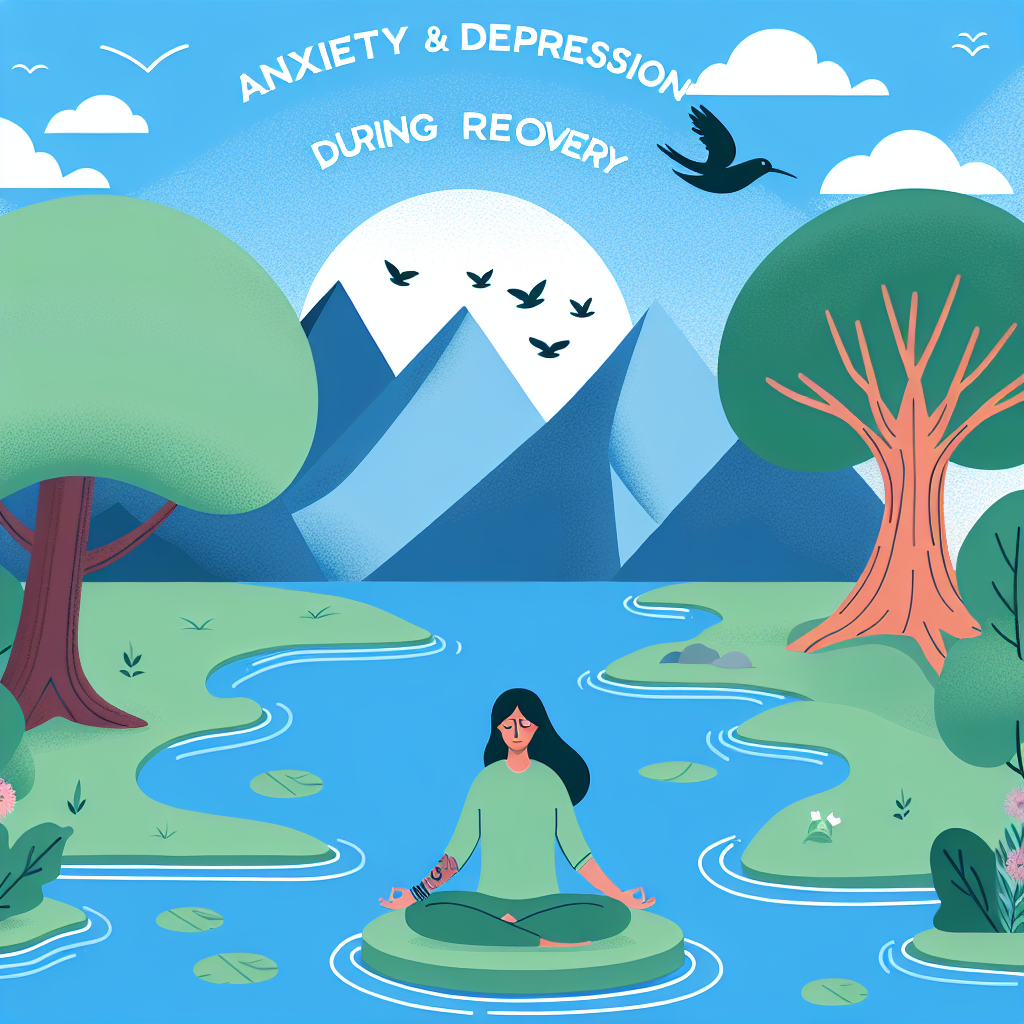-
Table of Contents

“Empower Your Healing: Strategies for Managing Anxiety and Depression in Recovery”
Introduction
Managing anxiety and depression during recovery is a multifaceted process that requires a combination of therapeutic strategies, lifestyle changes, and support systems. Recovery from mental health issues or substance abuse often brings its own set of challenges, including heightened emotional states and stressors that can exacerbate anxiety and depression. Effective management begins with understanding the underlying causes and triggers of these conditions. Cognitive-behavioral therapy (CBT) and other forms of counseling can provide essential tools for coping with negative thought patterns and emotional distress. Medication may also be prescribed to help stabilize mood and reduce symptoms. Additionally, incorporating regular physical activity, maintaining a balanced diet, and ensuring adequate sleep can significantly improve mental health. Building a strong support network, whether through support groups, family, or friends, is crucial for providing emotional support and accountability. Mindfulness practices such as meditation and yoga can also help in managing stress and promoting a sense of well-being. By integrating these approaches, individuals in recovery can better navigate their journey towards mental health and overall wellness.
Practical Strategies for Managing Anxiety in Recovery
Managing anxiety and depression during recovery can be a challenging journey, but with the right strategies, it is possible to navigate these turbulent waters and find a sense of peace and stability. One of the most effective ways to manage anxiety in recovery is through the practice of mindfulness. Mindfulness involves staying present in the moment and observing your thoughts and feelings without judgment. By focusing on the here and now, you can reduce the overwhelming nature of anxiety and create a sense of calm. Techniques such as deep breathing exercises, meditation, and progressive muscle relaxation can be particularly beneficial in grounding yourself and alleviating anxious thoughts.
In addition to mindfulness, establishing a routine can provide a sense of structure and predictability, which is often comforting for those dealing with anxiety. A consistent daily schedule that includes time for self-care, work, social activities, and relaxation can help you feel more in control and less overwhelmed. It is also important to prioritize sleep, as a good night’s rest can significantly impact your mood and anxiety levels. Creating a bedtime routine that promotes relaxation, such as reading a book or taking a warm bath, can improve the quality of your sleep and, in turn, your overall well-being.
Another practical strategy for managing anxiety in recovery is to engage in regular physical activity. Exercise has been shown to reduce symptoms of anxiety and depression by releasing endorphins, which are natural mood lifters. Whether it’s a brisk walk, a yoga session, or a more intense workout, finding an activity that you enjoy can make it easier to incorporate exercise into your daily routine. Additionally, physical activity can serve as a healthy distraction from anxious thoughts and provide a sense of accomplishment.
Social support is also a crucial element in managing anxiety during recovery. Connecting with others who understand your experiences can provide a sense of validation and reduce feelings of isolation. Support groups, whether in-person or online, can offer a safe space to share your struggles and receive encouragement from others who are on a similar journey. Building a network of supportive friends and family members can also provide emotional support and practical assistance when needed.
Furthermore, it is essential to address any negative thought patterns that may be contributing to your anxiety. Cognitive-behavioral therapy (CBT) is a highly effective approach that helps individuals identify and challenge distorted thinking patterns. By working with a therapist, you can learn to reframe negative thoughts and develop healthier ways of thinking. This can lead to a significant reduction in anxiety and an improvement in overall mental health.
Incorporating relaxation techniques into your daily routine can also be beneficial. Activities such as journaling, listening to calming music, or engaging in creative hobbies can provide an outlet for stress and anxiety. Finding what works best for you and making time for these activities can help you manage your anxiety more effectively.
Lastly, it is important to be patient with yourself and recognize that recovery is a gradual process. There will be ups and downs, but each step forward is a victory. Celebrate your progress, no matter how small, and remind yourself that you are capable of overcoming the challenges you face. By implementing these practical strategies and maintaining a positive outlook, you can manage anxiety in recovery and move towards a healthier, more fulfilling life.
Effective Techniques to Overcome Depression During Recovery
Managing anxiety and depression during recovery can be a daunting task, but with the right techniques, it is possible to overcome these challenges and lead a fulfilling life. One effective approach is to establish a routine. Having a structured daily schedule can provide a sense of stability and predictability, which can be particularly comforting during times of uncertainty. By setting specific times for waking up, eating meals, exercising, and engaging in leisure activities, individuals can create a balanced lifestyle that promotes mental well-being.
In addition to establishing a routine, practicing mindfulness can be incredibly beneficial. Mindfulness involves being present in the moment and fully engaging with one’s surroundings. This practice can help individuals become more aware of their thoughts and feelings, allowing them to address negative emotions before they escalate. Techniques such as deep breathing exercises, meditation, and yoga can all contribute to a heightened sense of mindfulness. These activities not only reduce stress but also promote relaxation and emotional stability.
Another crucial technique is to build a strong support network. Connecting with others who understand the challenges of recovery can provide invaluable emotional support. This can include joining support groups, attending therapy sessions, or simply talking to trusted friends and family members. Sharing experiences and feelings with others can help alleviate the sense of isolation that often accompanies anxiety and depression. Moreover, receiving encouragement and advice from those who have faced similar struggles can be incredibly motivating.
Physical activity is also a powerful tool in managing anxiety and depression. Regular exercise has been shown to release endorphins, which are natural mood lifters. Engaging in physical activities such as walking, running, swimming, or even dancing can help reduce symptoms of depression and anxiety. Additionally, exercise can improve sleep quality, boost self-esteem, and provide a healthy outlet for stress.
Nutrition plays a significant role in mental health as well. A balanced diet rich in fruits, vegetables, whole grains, and lean proteins can have a positive impact on mood and energy levels. Avoiding excessive consumption of caffeine, sugar, and processed foods can also help stabilize mood swings and reduce anxiety. Staying hydrated and maintaining a regular eating schedule are equally important in supporting overall mental well-being.
Furthermore, setting realistic goals can provide a sense of purpose and direction during recovery. Breaking down larger goals into smaller, manageable tasks can make them feel more achievable and less overwhelming. Celebrating small victories along the way can boost confidence and motivation, reinforcing the belief that progress is possible.
It is also essential to practice self-compassion. Recovery is a journey, and it is normal to experience setbacks along the way. Being kind to oneself and acknowledging that it is okay to have bad days can prevent feelings of guilt and self-criticism. Engaging in activities that bring joy and relaxation, such as reading, listening to music, or spending time in nature, can also help nurture a positive mindset.
Lastly, seeking professional help when needed is a vital component of managing anxiety and depression. Therapists, counselors, and medical professionals can provide tailored strategies and interventions to address individual needs. Medication may also be an option for some individuals, and consulting with a healthcare provider can help determine the best course of action.
In conclusion, overcoming anxiety and depression during recovery requires a multifaceted approach that includes establishing a routine, practicing mindfulness, building a support network, engaging in physical activity, maintaining a balanced diet, setting realistic goals, practicing self-compassion, and seeking professional help. By incorporating these techniques into daily life, individuals can navigate the challenges of recovery with resilience and hope.
Q&A
1. **Question:** What are some effective coping strategies for managing anxiety during recovery?
**Answer:** Effective coping strategies for managing anxiety during recovery include practicing mindfulness and meditation, engaging in regular physical exercise, maintaining a structured daily routine, seeking support from therapy or support groups, and avoiding caffeine and other stimulants.
2. **Question:** How can someone in recovery address depression symptoms?
**Answer:** To address depression symptoms in recovery, individuals can benefit from cognitive-behavioral therapy (CBT), medication prescribed by a healthcare professional, maintaining a healthy diet, ensuring adequate sleep, participating in activities that bring joy and fulfillment, and building a strong support network of friends, family, or support groups.
Conclusion
Managing anxiety and depression in recovery involves a multifaceted approach that includes professional therapy, medication when necessary, lifestyle changes, and support systems. Cognitive-behavioral therapy (CBT) and other therapeutic modalities can help individuals understand and alter negative thought patterns. Medications such as antidepressants or anti-anxiety drugs may be prescribed by healthcare providers to manage symptoms. Lifestyle changes, including regular exercise, a balanced diet, adequate sleep, and mindfulness practices like meditation, can significantly improve mental health. Building a strong support network through friends, family, or support groups provides emotional backing and reduces feelings of isolation. Consistent follow-up with healthcare providers ensures that treatment plans are effective and adjusted as needed. Overall, a comprehensive and personalized approach is essential for effectively managing anxiety and depression during recovery.



